Do you want to do SEO for your startup but don’t know what it entails, the benefits, how to begin, or if you need it?
This article contains all the fine details that you’ll need.
Is Startup SEO Different?
If you’re familiar with regular SEO, you probably feel there is no need for a different plan for startup websites. After all, SEO is the same for all websites. Right?
Sorry to burst the bubble, but startup SEO is a bit different.
How so?
At SERPReach, we have helped several businesses across diverse niches and verticals to build links since 2009. This enabled us to notice that startup SEO has 3 unique challenges.
- Getting buy-in
- Market and competition challenges
- Minimal resources
Getting Buy-in
Unlike other niches or businesses, startups have boards of investors. And in most cases, you must get their approval on everything — SEO included.
Unfortunately, not everyone understands the importance and benefits of SEO. The challenge now is convincing these investors — likely neutrals — to buy into your idea.
So, what should you do?
- Maybe pitch the marketing benefits of SEO?
- Say something about how ranking high on SERPs will increase traffic and leads.
There’s one issue with pitching in SEO:
Improved rankings are not assured. Like the familiar SEO saying, “it depends,” SEO performance depends on several factors outside your control.
Unfortunately, no investor will invest in something with no accurate result estimation.
Market and Competition Challenges
Let’s start with the market challenges…
You’ll likely be blown out of your depth if you’re a startup in a new market. How?
- For starters, there won’t be a template for success.
- You have to make all the mistakes and learn from them.
On the other hand, say you already have an established market. There are some challenges with that.
- First, your products must have unique selling points to get into a tight competition.
- The market leaders had already covered the search intents and keywords. What more can you do?
Either way, you’ll waste time and resources experimenting with search intents, content, and marketing ideas.
Now, let’s discuss competition challenges…
Startups in uncharted markets will likely have no competition. With no match, you can’t do competitor analysis or research.
How, then, will you get touchpoints?
How will you get data-driven strategies to succeed?
Minimal Resources
Startups are always looking for seed funds. Funnily enough, this is not just a trend for startups without traction.
You still need series funding even if your startup has already gained engagement like views, users, or revenue. Each round of funds will be bigger and come with more responsibilities than the former.
So, what can we make out of all these?
Compared to other businesses, startups have minimal resources. Also, they have a tight time frame to achieve results. Otherwise, there won’t be continued funding.
The challenge here is that SEO is a long game. It takes at least 3-6 months to see results.
What is the way out of these challenges:
Lay out your SEO plan. Ensure you focus more on likely benefits and time requirements.
More importantly, compile your ideas into illustrations and include examples of similar companies getting results with SEO.
With these challenges, you probably need clarification about SEO for startups. Can search engines really help your situation? Do you need it or not? If yes, when do you need it?
Let’s find out…
Do startups need SEO?
No, and yes!
When you don’t need SEO
While SEO benefits all businesses, you might not need it as a startup. Below are some of such cases.
Testing Phase
When deciding on the marketing strategy or product to launch, you need quick results for your A/B testing. In this case, you might get results in a couple of weeks.
If this is you, SEO can’t help your startup. Here is why:
SEO is diverse and needs time, strategizing & restrategizing, and patience. You can’t see increased search ranking, traffic, leads, or conversions in a couple of weeks. You need at least 3-6 months.
Market Complexities
SEO is not for you if you have yet to fully understand your market, the nature of your target audience, how to speak their language, and how to nail down your product pitch.
Here is why:
SEO is a strategic and calculated marketing tool. It works best when you know your target audience and understand their intent. Anything otherwise, you’ll have half-baked results or none at all.
Zero Awareness
No one is probably searching for your product for a new market or niche. There is no target keyword or search intent to optimize for when there are no search queries. In other words, there is no SEO.

Instead of SEO, invest in other marketing channels to raise awareness.
When You Need SEO
SEO can boost the reach of your startup. It can fetch more users, revenue, and angel investors.
Below are some of the best cases of using SEO for a startup.
Web-based Businesses
For a startup that bases its business activities around a website, doing SEO can catapult your reach and traction. How so?
People are on the web daily, seeking solutions to their problems. With a well-optimized website, search engines will suggest your business to these people by showing your business.
These suggestions are featured on search engine results pages. And the higher up you are, the higher the chances of visibility.
In turn, the search engine visibility will scale your startup and its revenue.
Pro tip:
SEO also works for app-based startups. But combine it with ASO (App Store Optimization) for the best results. ASO, like SEO, means improving your chances of app downloads and revenue via enhanced visibility on app stores.
Long-term Goals
Any effective marketing strategy takes careful planning, action, and monitoring for success. SEO is no different.
For SEO, you will write high-quality content, optimize it, and build links. All the while, you ensure that your website’s technical, front-end, and back-end are functional and responsive.
Ultimately, when the results start coming, you can’t stop. Otherwise, your competitors will overtake you on search results.
In summary,
SEO is a long-term project. Only startups with the same approach can get the most reward from it.
Limited Marketing Budget
Earlier, I talked about how the minimal resources for startups can be challenging. Nevertheless, you can get results as a startup using SEO. How so?
A part of your seed fund will undoubtedly go to marketing your products. For fast results, consider paid advertising. This will cost a fortune, especially for a competitive niche.
On the other hand, if you can play the long game and only have a limited marketing budget, SEO can help. The results will take longer than if you have a robust budget.
Regardless, you will get the required traction to raise better series funding for more aggressive marketing.
Benefits of Startup SEO
Doing startup SEO has several benefits. But we’ll discuss only the top 5.
- Enhanced visibility
- Brand trust
- Sustainable traffic
- Customer and product research
- Cost-effective solutions
Enhanced Visibility on Search Engines
Often, the only people looking up your website are your investors, employees, relatives, and you. While those groups are suitable for support, they can’t scale your startup.
To scale, you need enhanced visibility. Fortunately, that’s what SEO offers. SEO extends your website beyond your small circles, location, state, and country to everyone.
Note: enhanced visibility on search engines depends on your keyword rankings on search results. The higher you are on the search rankings, the higher your visibility.
Getting to page 1 (the first 10 results) is still a big feat. And such can get you the needed visibility to win more users.
User engagements and product downloads aside, enhanced visibility can improve your in-office visits. If your startup has a store, your SEO efforts will get prospective customers through the door.
Ultimately,
You will rank in organic search results and Google 3-pack for local searches.
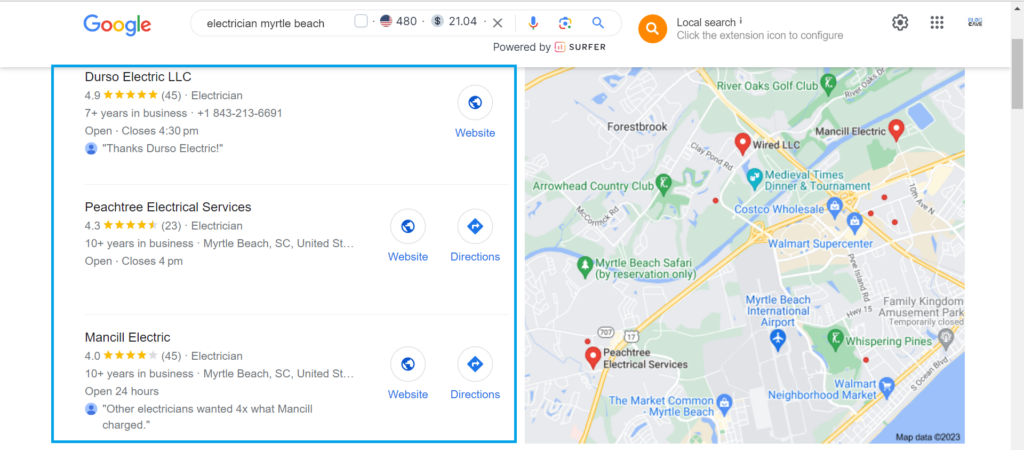
Pro tip:
Ranking high on Google 3-pack (local SEO) is as competitive as typical SEO. So, ensure your Google Business Profile is well-optimized and that your citations (Name, Address, and Phone number) are accurate & consistent.
Brand Trust
Visibility is one of many benefits of ranking high on search results. There is also the increased trust in your brand. How?
Let me explain with this example.
For example, say you need to learn something about content marketing. Then, HubSpot’s blog post was displayed as the most fitting result — you even got the answer to your query in the featured snippets from the company.
Another time, say you searched for email marketing tools. Again, HubSpot’s blog post was displayed as the no. 1 result.
What will come to your mind?
If HubSpot content is always number 1 on search results, Google must revere them. By extension, you’ll trust whatever HubSpot puts up. Even better, you’ll eagerly wait to see them and check their post in your following query.
Now, let’s relate that to startups…
The more prospects see your content in top-10 results, the more they will trust you, check you out, and be easy to convert.
Sustainable Traffic
The beauty of high-quality SEO is that it’s built on value and trust. The more value you create with your content, the more confidence you earn from other websites (for link building purposes) and prospective customers.
Hence, you will always have a stream of traffic.
Beautifully enough, only SEO brings the most sustained traffic. How about paid advertising?
Paid advertising is not built on trust and value. It is an ad that will likely not be clicked. Despite that, it is expensive.
In contrast to paid advertising, SEO strips away all forms of resistance and educates prospects about the benefits of your product. This way, you can get an unending bolt of organic traffic that is as affordable as possible.
Pro tip:
Ensure you get sustainable traffic from commercial- or transactional-driven keywords. The prospects looking for these have the highest tendency to buy your product.
Customer and Product Research
One of the core foundations of SEO is keyword research. It reveals what to write about, the intent to match, and the post’s format.
For example, say you type “keto diet planner” on Google search. You’d see results like this.
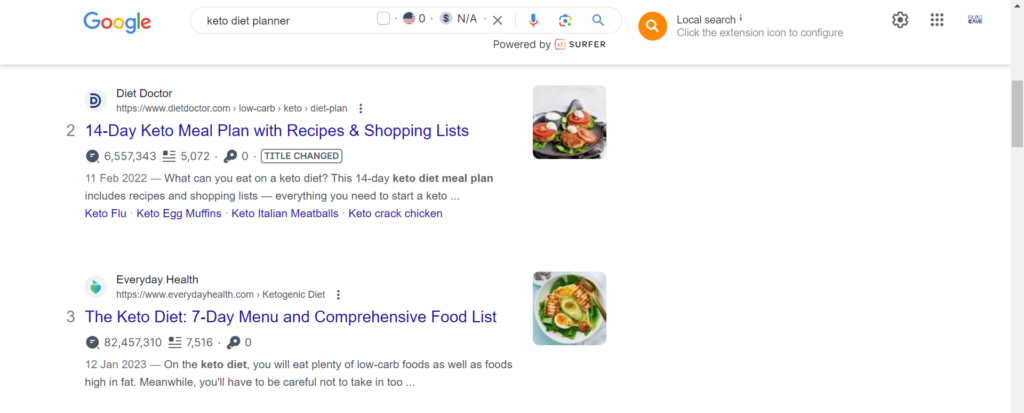
The results revealed a listicle is the best format and that the article should be informational.
In revealing pressing topics, keyword research also provides insights into customers’ needs. With it, you’ll know what potential customers are looking for, when, and in what quantity.
The best part is that keyword research can help create buyer personas. You can track demographics and other helpful market data with free tools like Google Analytics.
Cost-Effective Solutions
While SEO is not free, it is cheaper than other startup marketing channels. Besides, the money spent on SEO takes up time.
For example:
- If you hire a link builder, you do so to free up time to get more deals done or attend investor meetings.
- When you pay a writer to write a guest post or blog content, you do so to focus on planning other crucial details.
- The same thing applies to SEO tools. You subscribe to them to save time and energy from manual research.
Also, you can use several free SEO tools to get started. Prominent tools like Google Analytics and Google Search Console are accessible.
For backlink analysis, you can start with freemium offers from third-party providers like Semrush and Ahrefs.
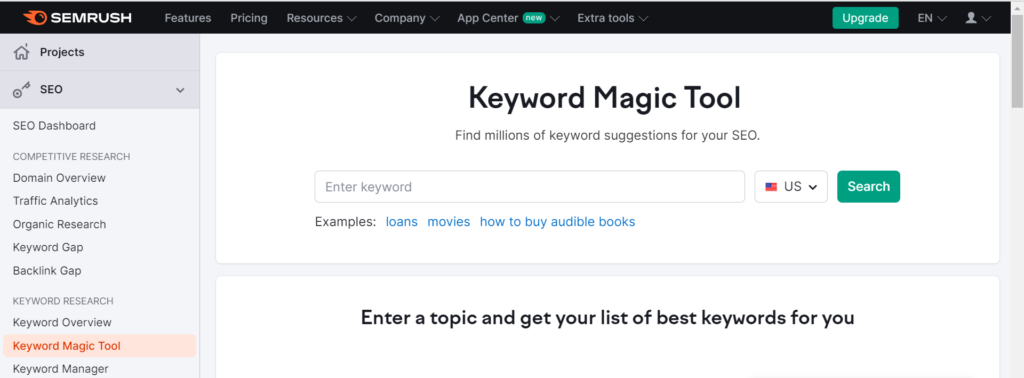
Ultimately, all SEO expenses are cost-effective. They save time and energy. More importantly, the ROI is impressive.
How to Do SEO for Startups in 5 Practical Steps
Here’s a quick overview of the steps needed to do startup SEO:
- Set SEO goals
- Keyword research
- Create and optimize your content
- Build links
- Track & measure goals
Set SEO Goals
There are many benefits to doing startup SEO, as mentioned earlier. Pick one of the benefits at this stage and mark it as your goal.
But be careful of setting generic goals like “converting more prospects.” Instead, refine the plans into SMART (specific, measurable, achievable, realistic, and timely) SEO-related bits.
Example:
- Generic goal — I want more users to download my product
- SMART SEO goal — I’ll increase the chances of product download by ranking in the top 3 in 6 months
Now, you have a SMART SEO goal. However, the goal-setting stage is still ongoing.
You still need to split the overall goal into smaller bits like this:
- SMART goal
- Action plan
- Process
You’ll explain how you plan to measure results for the SEO tasks. How?
Here is an example:
📌 SMART goal — I’ll increase the chances of product download by ranking in the top 3 in 6 months
Measurement: rank tracker tools from Ahrefs, Semrush, or SERanking
📌 Action plan — I’ll get 10 high-quality backlinks monthly
Measurement: use backlink and site explorer tools from Ahrefs or Semrush
📌 Process — I’ll vet and reach out to 10 target pages weekly
Measurement: backlink quality checker and email tools
Keyword Research
Earlier, I mentioned how keywords are crucial for customer and product research. Beyond that, they are the cornerstone of your assets for startup SEO.
So, you must get this step right. How can you start?
If you’re relatively new to SEO, target easy-to-rank keywords. These terms have low KD (keyword difficulty) scores, and you can rank your posts with relatively few or no backlinks.
Let me show you an example.
Enter a broad term into Ahrefs Keyword Explorer. I’ll be using “keto diet planner”
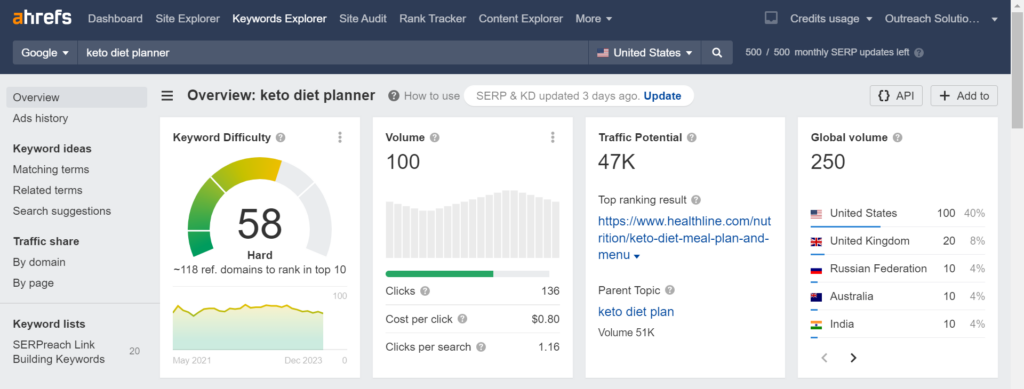
Can you see that the KD score is high?
So, I’ll tweak my research even more until I have an easier KD score like this:

Here is how to go about what I just did:
- Go to Ahrefs Keyword Explorer
- Enter a broad term
- Filter the search result with KD. Set it to a max of 20.

Furthermore, target competitors’ easy keywords. Here’s how to do that:
- First, identify your competing domains
- Go to Ahrefs Site Explorer
- Input your domain and scroll to the top competing domains

- Next, check for competitor’s easy keywords
- Go to Ahrefs Site Explorer
- Input the domain > Organic Keywords

- Add a “KD 20” filter to the result
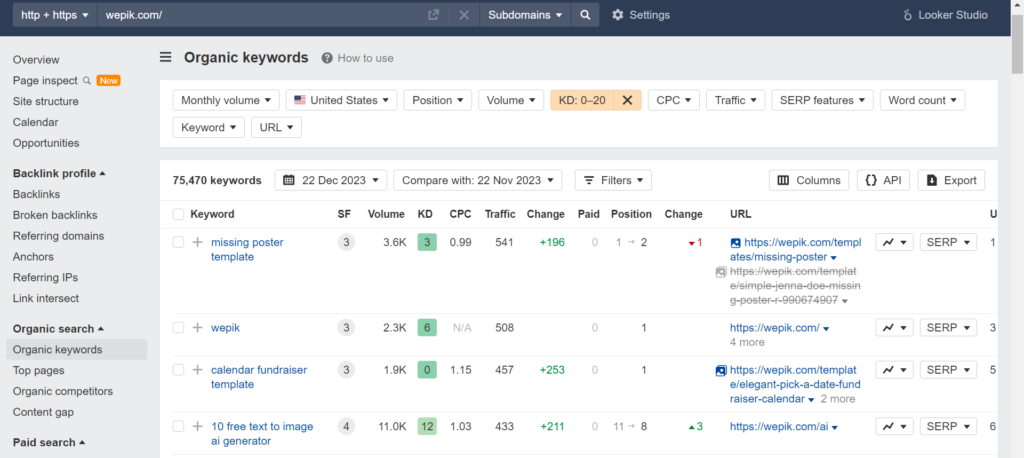
Create and Optimize Your Content
With the keyword part done, it is time to create your assets: content. Like other niches, content is crucial to SEO (and link building). As such, it needs careful planning.
Here is how to get started:
- Model your content on what works — are the top results blog posts, videos, review articles, or landing pages? What is the format and angle?
How to determine what’s working on SERPs:
Type your keyword into Google Search
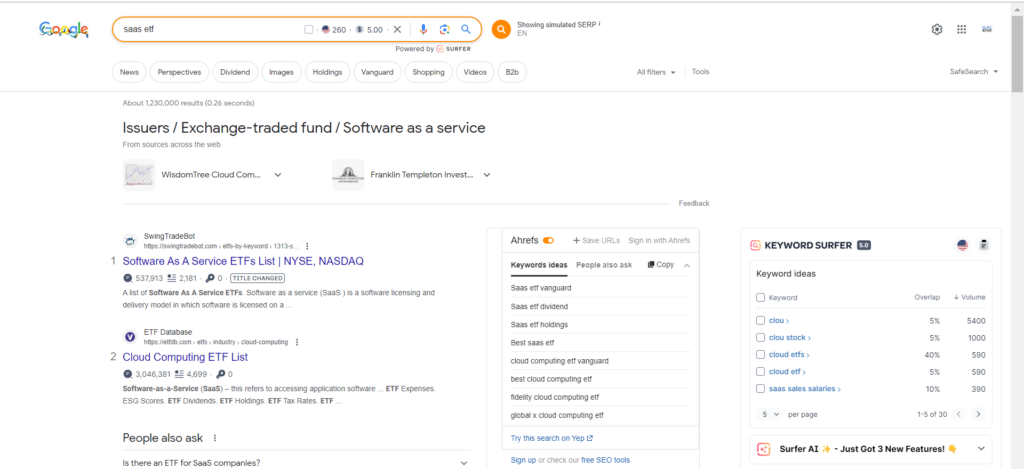
Check through the results
In the code of our example, here is a model of what’s working:
Dominant content type: Listicle
Angle: roundups of investment opportunity
- Ensure your content is keyword-optimized — use the keyword strategically in your content. And ensures it answers as many questions as naturally possible.
- Don’t be stuck on keyword metrics — combine your research with user intent.
- Sort your research ideas into a content calendar.
- Remember to milk your content for all its traffic. In other words, repurpose your content across different channels to get the most out of your efforts.
Build Links
Targeting low-competition keywords will only get you a little traffic. You still need to rank for the high-competition terms as they have more chances of leading to sales. Hence, the importance of building links.
So, how can you go about link building as a startup?
- Before searching for backlinks, use internal links effectively. Ensure your top linkable assets are linked to your money pages.
E.g., your high-traffic blog post should lead to your product or demo page
- Next, target high-quality backlinks from guest posts and niche edits
- Get your products feature on high-traffic “best-of” articles and buying guides
- Target quality PR links to discuss the impact of your products
- Lastly, check for cracks in competitors’ backlinks and explore them for your gains
Pro tip:
Don’t restrict internal linking to your money pages; share some love with your underperforming pages, too.
Track & Measure Goals
You have done the groundwork — keyword research, content, and backlinks. Now is the time to check how well it all panned out.
So, how should you go about tracking and measuring your goals?
Let’s use our example from the “set goal” step.
- SMART goal — I’ll increase the chances of product download by ranking in the top 3 in 6 months
- Tracking: how many target keywords do your website rank for, and in what positions?
- Action plan — I’ll get 10 high-quality backlinks monthly
- Tracking: how many backlinks are pointing to your websites, and from where?
- Process — I’ll vet and reach out to 10 target pages weekly
- Tracking: do you get replies from your email outreach? What is the success rate?
Ultimately, your bucket list should lead to the overall goal of increasing product downloads or subscriptions. This is when your startup SEO efforts have been successful.
Verdict: Does Your Startup Need Search Engine Optimization?
Startup SEO has some peculiarities, like resource and competition challenges, which make it different from other niches. Nevertheless, it has its benefits when done right.
However, note that learning about the benefits of startup SEO is one thing. You must practice the steps discussed in this article to see results (SEO success).
So, go over the details and create an effective SEO strategy for your startup.
FAQs
What Tools Are Needed for Startup SEO?
Google Search Console (GSC)
GSC is the best FREE tool to monitor your search engine rankings, traffic, and keywords.
Plus, GSC suggests ways to improve your website.
Paid Tools
Tools like Ahrefs and Semrush will be helpful for backlink and competitor analysis. Plus, they are resourceful keyword research tools. However, they are costly.
Are There Examples of Startups Getting Results From SEO?
Yes. Companies like Zapier, Instacart, and Canva are examples of startups with effective SEO strategies. They use SEO extensively – using relevant keywords and the best SEO practices. Today, they are industry leaders across their various niches.
Can You Do SEO Yourself?
You can follow the steps discussed in this article (and other posts on our blog) to start SEO as a beginner. However, if you need quick and sustainable results or a large project, getting help from an SEO agency is a no-brainer.

